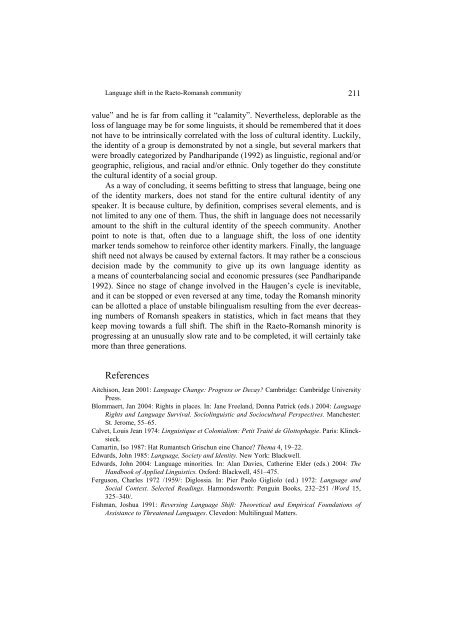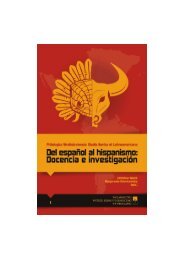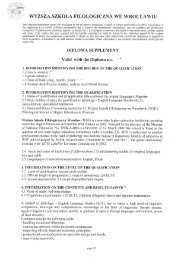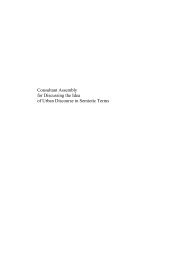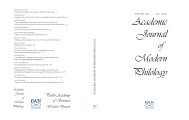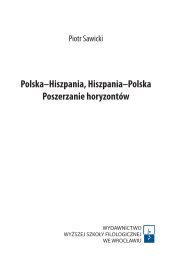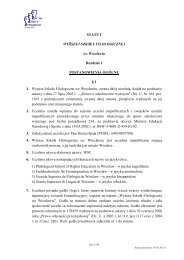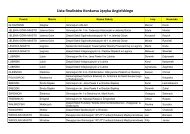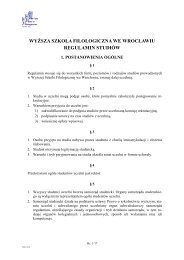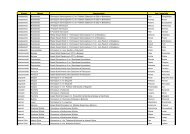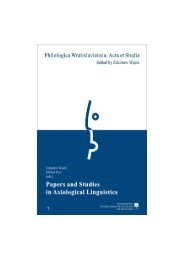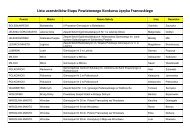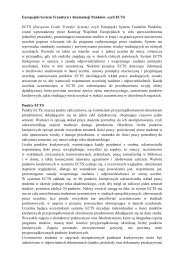s - Wyższa SzkoÅa Filologiczna we WrocÅawiu
s - Wyższa SzkoÅa Filologiczna we WrocÅawiu
s - Wyższa SzkoÅa Filologiczna we WrocÅawiu
You also want an ePaper? Increase the reach of your titles
YUMPU automatically turns print PDFs into web optimized ePapers that Google loves.
Language shift in the Raeto-Romansh community 211<br />
value” and he is far from calling it “calamity”. Nevertheless, deplorable as the<br />
loss of language may be for some linguists, it should be remembered that it does<br />
not have to be intrinsically correlated with the loss of cultural identity. Luckily,<br />
the identity of a group is demonstrated by not a single, but several markers that<br />
<strong>we</strong>re broadly categorized by Pandharipande (1992) as linguistic, regional and/or<br />
geographic, religious, and racial and/or ethnic. Only together do they constitute<br />
the cultural identity of a social group.<br />
As a way of concluding, it seems befitting to stress that language, being one<br />
of the identity markers, does not stand for the entire cultural identity of any<br />
speaker. It is because culture, by definition, comprises several elements, and is<br />
not limited to any one of them. Thus, the shift in language does not necessarily<br />
amount to the shift in the cultural identity of the speech community. Another<br />
point to note is that, often due to a language shift, the loss of one identity<br />
marker tends somehow to reinforce other identity markers. Finally, the language<br />
shift need not always be caused by external factors. It may rather be a conscious<br />
decision made by the community to give up its own language identity as<br />
a means of counterbalancing social and economic pressures (see Pandharipande<br />
1992). Since no stage of change involved in the Haugen’s cycle is inevitable,<br />
and it can be stopped or even reversed at any time, today the Romansh minority<br />
can be allotted a place of unstable bilingualism resulting from the ever decreasing<br />
numbers of Romansh speakers in statistics, which in fact means that they<br />
keep moving towards a full shift. The shift in the Raeto-Romansh minority is<br />
progressing at an unusually slow rate and to be completed, it will certainly take<br />
more than three generations.<br />
References<br />
Aitchison, Jean 2001: Language Change: Progress or Decay? Cambridge: Cambridge University<br />
Press.<br />
Blommaert, Jan 2004: Rights in places. In: Jane Freeland, Donna Patrick (eds.) 2004: Language<br />
Rights and Language Survival. Sociolinguistic and Sociocultural Perspectives. Manchester:<br />
St. Jerome, 55–65.<br />
Calvet, Louis Jean 1974: Linguistique et Colonialism: Petit Traité de Glottophagie. Paris: Klincksieck.<br />
Camartin, Iso 1987: Hat Rumantsch Grischun eine Chance? Thema 4, 19–22.<br />
Edwards, John 1985: Language, Society and Identity. New York: Black<strong>we</strong>ll.<br />
Edwards, John 2004: Language minorities. In: Alan Davies, Catherine Elder (eds.) 2004: The<br />
Handbook of Applied Linguistics. Oxford: Black<strong>we</strong>ll, 451–475.<br />
Ferguson, Charles 1972 /1959/: Diglossia. In: Pier Paolo Gigliolo (ed.) 1972: Language and<br />
Social Context. Selected Readings. Harmondsworth: Penguin Books, 232–251 /Word 15,<br />
325–340/.<br />
Fishman, Joshua 1991: Reversing Language Shift: Theoretical and Empirical Foundations of<br />
Assistance to Threatened Languages. Clevedon: Multilingual Matters.


